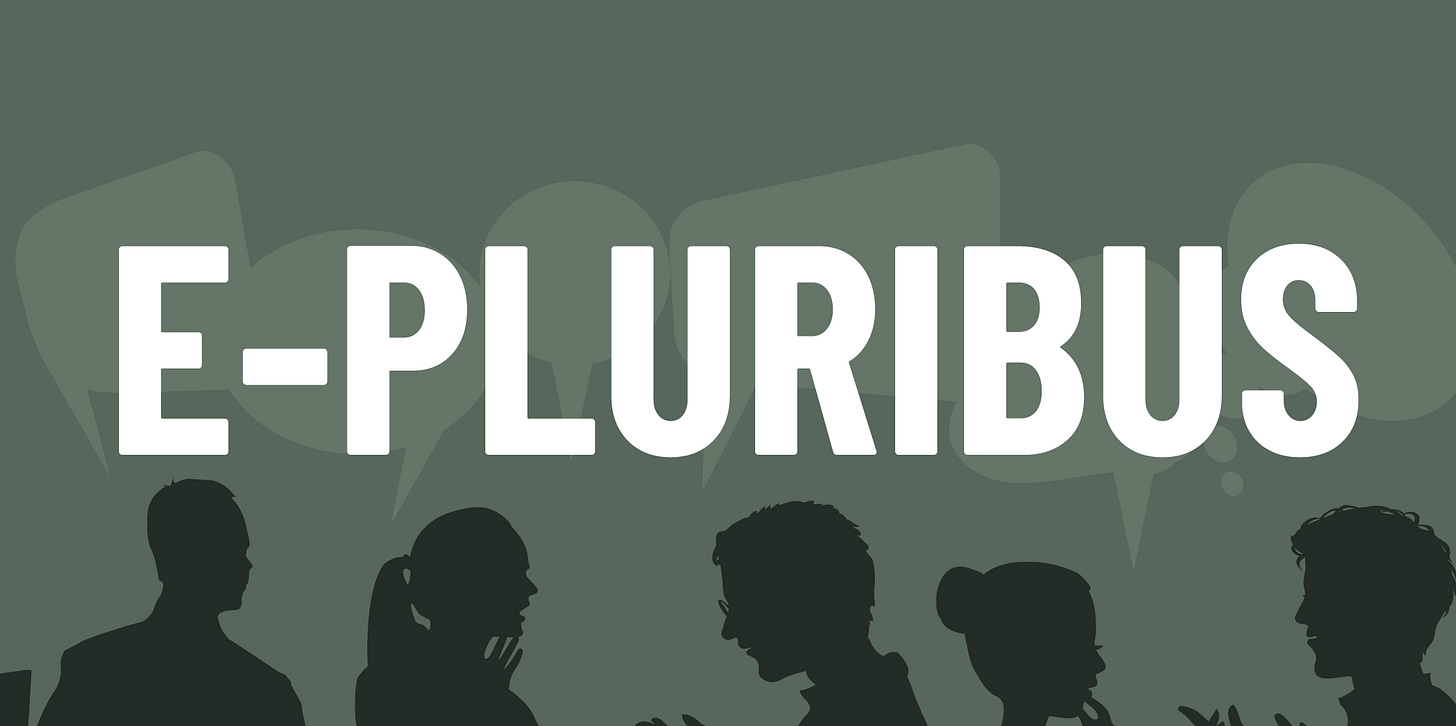E-Pluribus | March 28, 2022
The top-down pressure on colleges for diversity, equity, and inclusion; a music journalist tells her story of cancellation; and unfairness in the classroom masquerading as fairness.
A round up of the latest and best writing and musings on the rise of illiberalism in the public discourse:
Wenyuan Wu: Regulatory Capture of Diversity, Equity, and Inclusion in Higher Education
Pressure on colleges to institute “diversity, equity, and inclusion” (DEI) initiatives often come from students or faculty, but regulatory bodies and agencies have an influence as well. Wenyuan Wu of the Californians for Equal Rights Foundation writes at Minding the Campus about the proposed standards of the California Community Colleges that would impact over 91,000 employees in the state.
The craze to elevate DEI and anti-racism as inherently good, without providing substantive justifications or leaving any room for conceptual clarifications, is intimately linked with the education apparatus’s thirst to racially balance. In his April 2020 letter to Governor Gavin Newsom, CCC Chancellor Eloy Ortiz Oakley frames the institution’s DEI approach as one that identifies “strategies to increase the racial and ethnic diversity of the California community college workforce.” In November 2021, Los Angeles Mission College, the #1 ranking community college in the CCC system, was named “Equity Champion of Higher Education” for its “exemplary work in awarding Associate Degrees for Transfer (ADT) to Latino students.” Ironically, the Campaign for College Opportunity, the non-profit organization that hands out these equity champion awards, was a major political proponent of the “Yes on Proposition 16” campaign in 2020. The failed statewide ballot measure had sought unsuccessfully to scrap California’s constitutional principle of equal protection, which states:
The State shall not discriminate against, or grant preferential treatment to, any individual or group on the basis of race, sex, color, ethnicity, or national origin in the operation of public employment, public education, or public contracting.
The DEI cult that seeks to capture CCC subscribes to the bizarre and untested hypothesis that you can fight fire with fire and cure discrimination with more discrimination, the illogical basis of Kendian anti-racism. Instead of serving the public interest by providing quality, affordable career or college transfer pathways for its students, CCC has been co-opted to advance the ideological concerns of special interest groups such as the radical political establishment, fringe non-profits, unions, and CRT ideologues. At the March 21st board meeting, Chancellor Ortiz Oakley listed “equitable student placements for low-income, first-generation students and students of color” as a top priority for the school system, a position echoed by most of the board members. Equal treatment has been overshadowed by racial spoils and political favoritism.
CCC’s DEIA proposal would undoubtedly chill free speech and academic freedom. In the prospective “classification-specific obligations,” faculty members are required to implement culturally affirming practices and “employ teaching and learning practices and curriculum that reflect DEIA and anti-racist principles.” Moreover, the DEIA obligations extend beyond a pedagogical emphasis on anti-racism to call for the integration of “anti-racist principles into existing policies and practices, funding allocations, decision-making, planning and program review processes.”
Read it all here.
Eve Barlow: A Ghost Story
At Bari Weiss’s Common Sense Substack, journalist Eve Barlow tells a harrowing story of how her industry and many individuals in it pulled the rug out from under her in the wake of her comments calling out those damaging synagogues during Black Lives Matter protests in the summer of 2020.
I remember a particular conversation I had with this friend about how we had already been squeezed into a minority token quota as women music journalists, and won battles on that field, and now that quota wouldn’t be as available to us, because we were being demoted as “white.” We were no longer the relevant minority. We were now the height of privilege. We both agreed on this. We were both terrified. But I was the only one who said something.
The weekend of the initial BLM protests in L.A., synagogues were vandalized, and me being me I can never keep my mouth shut, even when I really wish I could, and I put my foot in it. I tweeted, “How dare you,” and all hell break loose.
It was decreed that I was a racist by my entire industry. And I remember talking to this woman, and talking to my former editor at GQ, who expressed empathy but said that I’d had a “mini yikes” moment. Meanwhile, everyone else was having a major yikes moment, in my opinion, becoming indoctrinated en masse. I listened to the Sam Harris podcast that week, which was either ill or brilliantly timed depending on the side of the woke fence you sat on, and was comforted by his courage in analyzing actual data about racism and police brutality to bring some sobriety back into the room. I didn’t tell anyone that I listened to that episode. I didn’t share it. You think I’m suicidal?
[ . . . ]
I want to remind you of something important. Whether it’s in work, in your relationships, in your family, whatever context, you may find yourself being punished for speaking out, and speaking freely. It’s because the truth scares people. And if you’re like me, you will go through every single period of your life, losing investments you made when you find out that friends or jobs or invitations dry up after you said what needed to be said. Know this: you’ll survive. It’s okay. Actually, it’s more than okay. The best relationships and the right opportunities handle the truth. The ones that can’t were never reciprocal. They were never real. They were never honest.
Read it all.
Allie Simon: Students, professors demand scholar be allowed to call on ‘white, male, or someone privileged’ last
Teachers often face challenges when trying to encourage greater class participation, but one teacher’s method of moving “white, male, or . . . privileged” students to the end of the line didn’t fly at Binghamton University after the syllabus was publicized. This did not prevent some students and faculty from supporting the professor in an attempt to reinstate her policy, reports Allie Simon for The College Fix.
Binghamton University sociology Professor Ana Maria Candela spelled out a policy in her syllabus that prioritized calling on “minorities, women and shy people,” reported Syracuse.com.
Candela wrote in her syllabus that “if you are white, male, or someone privileged by the racial and gender structures of our society to have your voice easily voiced and heard, we will often ask you to hold off on your questions or comments to give others priority and will come back to you a bit later or at another time,” the New York Post reported.
Candela was reportedly forced to remove her policy from the syllabus. Students and professors demand she be allowed to put it back in.
[ . . . ]
At BU, over 100 people gathered to support Professor Candela and her progressive stacking policy in a rally on March 4, with some advocating for academic freedom and “Kick[ing] Racism out of Bing,” WSKG reported.
Professor and rally attendee Tina Chronopoulos told the news outlet she felt the university should not have censored Candela.
“[Faculty] are worried that, you know, whenever they bring up, quote unquote, ‘these difficult topics,’ that they’ll get blowback from people who feel like they’re being discriminated against,” she said.
At the end of the rally, Candela spoke to the crowd, stating she feels that the support she has received shows that affirmative action policies such as progressive stacking are still needed.
[ . . . ]
[O]ne student in Professor Candela’s class, Sean Harrigan, filed a Title IX complaint against her progressive stacking policy for discrimination based on sex.
“How am I supposed to get a full participation grade if I’m not called on because of the way I was born?” Harrigan told the New York Post.
A statement put out by the BU Women’s Student Union opposed Harrigan’s decision to file the Title IX complaint, stating he brought a “privileged and white perspective.” The organization stated it does not feel that the progressive stacking policy is discriminatory, instead believing that this is a “culture where ‘whiteness’ is the norm and Western ideals set up the basis of our education system.”
Read the whole thing.
Around Twitter
Excerpts from a thread by the Foundation for Individual Rights in Education’s Greg Lukianoff based on a Daily Beast article he co-wrote:
Via Heterodox Academy, a few excerpts from that Greg Lukianoff Daily Beast piece:
And finally, we can’t just ignore the big story from the weekend, so without further comment:









